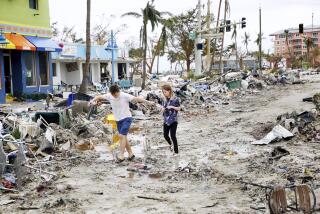Q&A: Did U.S. reject foreign help on gulf oil spill cleanup?
- Share via
Reporting from Washington — A handful of critics, led by Republicans in Congress and conservative commentators, has recently blasted the administration as slow to accept equipment and other assistance from foreign countries offering to help with the gulf oil spill cleanup.
They’ve focused their critique on an offer from the Netherlands of oil-skimming booms. Some contend that the administration initially refused that offer and others out of a resistance to waive the Jones Act of 1920 — a law that bars foreign vessels from carrying cargo between points in the U.S. — as President George W. Bush did briefly after Hurricane Katrina in 2005.
The White House, Coast Guard Adm. Thad Allen and the State Department have pushed back against the criticism, saying the Jones Act has not impeded the cleanup and foreign assistance has been accepted when needed.
Did the Dutch offer assistance immediately after the Deepwater Horizon exploded?
The State Department says the Dutch government and private businesses offered various types of assistance on April 30, 10 days after the explosion. It included proposals to sell equipment as well as offers of technical advice.
Romania, Norway, Spain, Sweden and Britain made similar offers that same day, according to a summary provided by the State Department. The Netherlands’ offer consisted of “state-of-the-art skimming arms made by the Dutch company Koseq,” said a statement issued by the Dutch Embassy. The Netherlands also offered to help Louisiana build sand berms intended to keep the oil from washing ashore.
Did the U.S. reject the offers?
On May 5, the State Department issued a statement acknowledging that it had received several offers from countries. “While there is no need right now that the U.S. cannot meet, the U.S. Coast Guard is assessing these offers of assistance to see if there will be something which we will need in the near future,” the statement said.
The offer of skimmers was accepted on May 23, when BP purchased three Koseq sweeping arms.
As of June 21, the other Dutch offers were considered “under consideration,” and the response team had also accepted aid from Mexico, Canada and Norway.
Did the Jones Act prevent the U.S. from immediately accepting the assistance?
The administration and Allen said the Jones Act had not prevented the response team from accepting the offers. In a June 11 news briefing, Allen, the national incident commander, said, “We are more than willing to consider Jones Act waivers,” and noted that foreign vessels were being used. A statement issued June 18 said that 15 foreign-flagged vessels were involved in the cleanup, and none required Jones Act waivers.
That’s in part because of a specific exemption in the act that can allow for the use of foreign “oil spill response vessels,” said H. Clayton Cook, a Washington attorney and expert on the Jones Act.
Cook, a Republican, said there had been longstanding opposition to the act, which many see as protectionist and a bow to unions, but there was no evidence that the Jones Act was standing in the way of the cleanup. “This is being used for political purposes. It’s a classic red herring.”
Why did it take more than three weeks to buy the Dutch skimmers?
U.S. officials did not directly answer this question. A State Department spokesman suggested that the nature of the offer and bureaucratic requirements might have something to do with it.
The Dutch offer, like most offers of foreign assistance, was to sell supplies, State Department spokesman Philip J. Crowley told reporters. “And in determining whether to accept these offers, we look at the availability of domestic sources and also compare pricing on the open market. So that may be one of the reasons why, in some cases, we’ve been able to accept these offers and pursued them,” he said.
kathleen.hennessey@latimes.com
More to Read
Sign up for Essential California
The most important California stories and recommendations in your inbox every morning.
You may occasionally receive promotional content from the Los Angeles Times.











